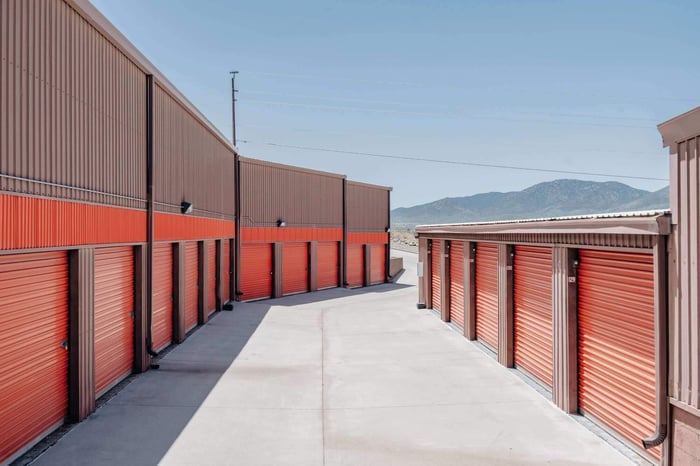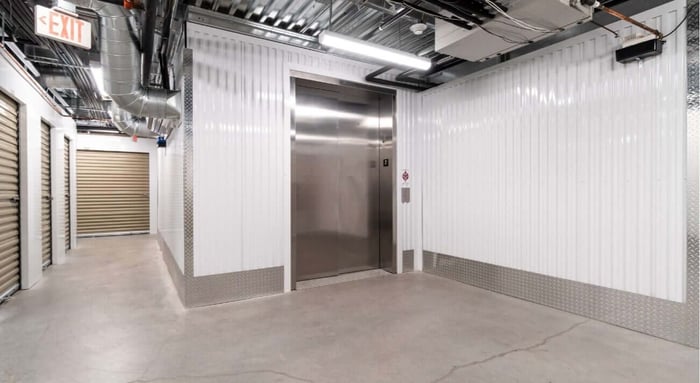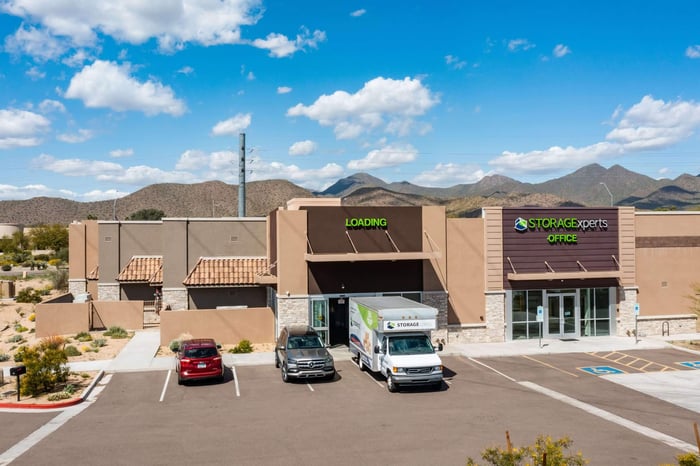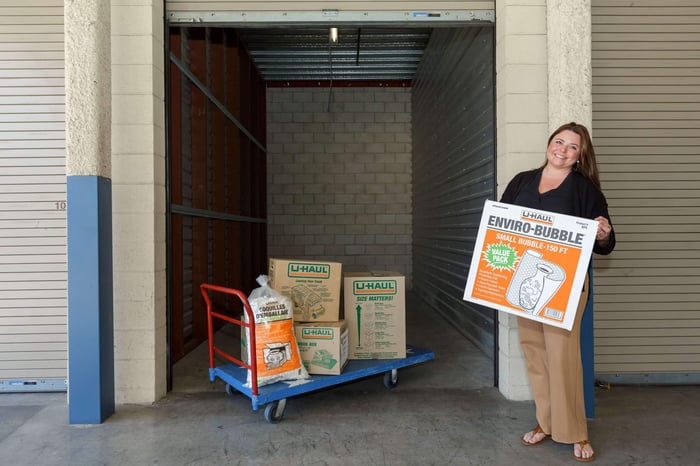When life changes, storage helps. Whether you're planning a move, downsizing, renovating, or overwhelmed by clutter in your garden shed or car garage, the question often arises: What items can I store in a unit? At STORAGExperts, we help customers from all walks of life find the proper storage or self-storage unit solution for their unique needs. From families packing up their household items to company owners storing valuable inventory, the answer to what you can store depends on the storage facility, the unit size, and key rules—because you can store almost anything with the proper setup.
So let's break it down. We'll cover what you can safely store, the types of goods you should avoid, what's typically restricted, and the best way to organize your storage space to get the most out of every square foot. This guide will give you a complete list of approved items, tips for protection based on condition and sensitivity, and guidance on making the most of your experience with self-storage facilities. We'll also highlight the risk factors to consider, like climate change or extended times in storage, especially when it comes to delicate clothes or valuables.
Why Do People Use Storage Units?
People turn to storage facilities for all kinds of reasons:
- Moving to a new place and needing temporary storage
- Downsizing but wanting to keep cherished belongings
- Making room for a new baby, home office, or guest bedroom
- Students storing furniture, clothing, and electronics over the summer
- Seasonal storage of decorations, tools, or sports equipment
- Businesses need secure space for documents, files, or equipment.
- Military personnel deployed overseas need to store things long-term.
At STORAGExperts, we see all kinds of items pass through our facilities. Our storage company is equipped to handle everything from boxes of tires to fragile antiques. We're proud to offer flexible storage solutions to fit every need—whether you need a single unit, multiple units, or extra storage space for large or sensitive items. Compared to other companies, we allow you to choose what fits your situation without hidden fees or unnecessary liability. It's a smart way to save money while keeping your belongings safe—something others might overlook. When evaluating what items you can store in a unit, consider larger possessions, such as your motorcycle, which can be securely parked away from the elements to prevent rust and damage.
Most Common Items You Can Store in a Unit
Storage units can hold almost anything—as long as it's legal, safe, and within the facility's guidelines. No matter the type of property you're storing, having the correct information on hand can help you make the best decisions. Whether dealing with gas tanks, seasonal gear, or heirlooms, choosing a self-storage solution that fits your needs is key. Talking to a pro is always a good idea if you're unsure. Here are some of the most popular items people store:
1. Household Items
This is one of the top reasons people rent storage units. If you'd find something in a typical home, chances are it's storage-safe. These include:
- Furniture like couches, wood furniture, bed frames, dressers, and tables
- Appliances such as refrigerators, washers, dryers, and microwaves
- Boxes of books, clothing, documents, or decor
- Toys, artwork, blankets, and seasonal decorations
- Small tools, cleaning supplies, and instruments
These items are easily stored for months or years when appropriately packed in plastic containers or reinforced boxes.
2. Electronics
Electronics can be safely stored in a climate control unit, from TVs to computers to stereo systems and gaming consoles. Consider using a durable container to protect your items from dust, theft, and damage. If you're storing in high-traffic areas, make the extra effort to secure each item correctly. Whether in your attic or a rented storage unit, following regulations for electronic storage is key to maintaining their condition for a lot longer. To protect against temperature fluctuations, dust, and humidity, always:
- Cover electronics in breathable fabric
- Remove batteries to prevent corrosion
- Keep them elevated in case of moisture
Electronics are susceptible to mildew, mold, and heat, so these units are best for long-term storage.
3. Business Items
Self-storage is perfect for businesses, freelancers, and e-commerce sellers who need space to store:
- Documents, files, and tax records
- Inventory like supplies, bags, and clothing
- Office equipment, furniture, and computers
- Trade show materials, signage, and promotional items
Storing your business assets in a storage unit gives you flexibility without the overhead cost of commercial rent.
Can You Store Vehicles?
Yes—many storage facilities, including STORAGExperts, offer vehicle storage options for:
- Cars, trucks, and motorcycles
- RVs, camping gear, and travel trailers
- Boats and personal watercraft
- Off-road vehicles like ATVs or dirt bikes
Vehicle storage requires some preparation: clean the vehicle, remove personal belongings, check for fluid leaks, and consider using a cover for protection. You will need valid registration and insurance, and if the storage facility requires a full gas tank, suppose you're looking to store a car in a storage unit for a long time. In that case, it's essential to take additional steps, such as using a car cover to protect against dust and the elements and periodically starting the engine to maintain battery health.
Unique & Specialty Items You Can Store
People get creative with their storage needs. We've seen everything from high-end collectibles to quirky memorabilia stored safely. Individuals often store larger items like an RV, boat, or truck, especially when space on their premises is limited. The number of items may vary, but whether it's something wet like camping gear or seasonal equipment, we've seen it all stored carefully. Here are some specialty items people often store:
- Antiques, artwork, and instruments
- Family heirlooms, photos, and keepsakes
- Musical instruments and DJ gear
- Bicycles, scooters, and tools
- Hobby equipment like sewing machines, crafts, and sports gear
Climate control units benefit sensitive items like these by helping maintain safe temperatures and prevent issues like mold, moisture, and damage.
What About Outdoor Items?
Outdoor items like gardening tools, luggage, patio furniture, or pool gear are perfect for storage. Before placing them in your unit, ensure they're clean, dry, and pests-free.
Items You CANNOT Store (Important!)
Every storage facility has its restrictions, but most follow standard rules to ensure safety, security, and quality for everyone.
Here's what you generally can't store:
- Perishables like food, meat, or foods that could spoil or attract rodents
- Living animals or plants (lives must be protected elsewhere!)
- Weapons, firearms, ammunition, and explosives
- Gasoline, propane, and other flammable liquids
- Drugs, illegal substances, or any controlled items
- Chemicals, hazardous materials, and toxic substances
Why? These items can cause fire, health hazards, or damage to nearby units—and no one wants that. Always read your self-storage facility agreement and ask if you have questions.
Organizing Your Storage Unit Like a Pro
A unit is only helpful if you can find what you need. Here are top storage tips from the STORAGExperts team:
1. Label Everything
Use clear containers, detailed labels, and a color-coded system. Write what's inside on every box and list items for reference.
2. Create an Inventory Sheet
Track what you've stored—especially if you use your unit for inventory, supplies, or documents. Knowing your stuff is just a click away helps avoid duplicate purchases or confusion.
3. Protect from Temperature Damage
Choose a climate-controlled storage unit for electronics, instruments, and collectibles. High temperatures, humidity, and fluctuations can cause warping, rust, and irreversible damage.
4. Stack Smart
Heavy items are on the bottom and light on top. Use shelves for fragile or regularly used items. Keep an aisle down the middle for easy access.
5. Use the Vertical Space
Most storage units are taller than they are wide. Stack boxes, use tools like hanging shelves or pegboards, and use wall space creatively.
Pro Tips from STORAGExperts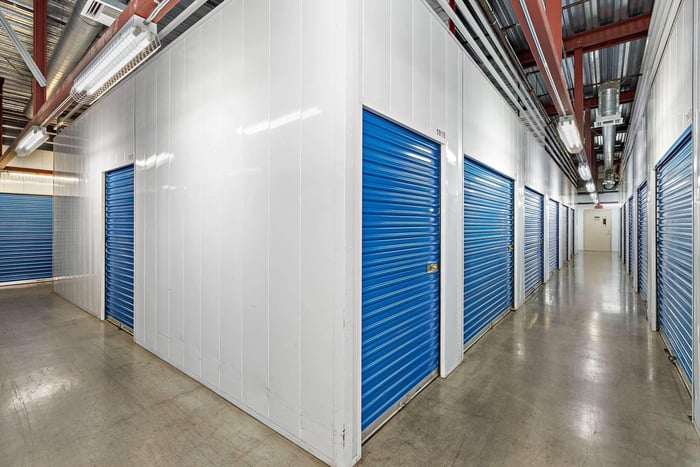 Looking for storage in Scottsdale, Arizona? STORAGExperts offers safe, flexible units for everything from furniture and electronics to seasonal gear and vehicles.
Looking for storage in Scottsdale, Arizona? STORAGExperts offers safe, flexible units for everything from furniture and electronics to seasonal gear and vehicles.
 Looking for storage in Scottsdale, Arizona? STORAGExperts offers safe, flexible units for everything from furniture and electronics to seasonal gear and vehicles.
Looking for storage in Scottsdale, Arizona? STORAGExperts offers safe, flexible units for everything from furniture and electronics to seasonal gear and vehicles.We've helped thousands of people organize and store their belongings. Here's what we've learned:
- Always consider insurance to protect your possessions
- Don't store high-value items unless they're fully covered
- Make sure your unit is properly locked with a durable padlock
- Avoid storing things you'll need weekly—think of them as a long-term
- If it has value or sentimental importance, give it the protection it deserves.
Final Word: A Solution for Every Storage Need
Whether you're storing appliances, clothing, decor, tools, or even vehicles, STORAGExperts has a storage solution. We offer various unit sizes, storage facilities, and services to make your life easier. From single containers to warehouse-sized spaces, we have something for everyone.
So, what items can you store in a unit? In short, almost everything—as long as it's safe, legal, and follows our facility's rules. With proper care, smart packing, and the right support from our team, your stuff will be in good hands.
Ready to reclaim your space? Contact STORAGExperts today to find the perfect storage unit for your needs.
FAQs About What You Can Store
What are your standard access hours, and is 24/7 access available?
Most facilities offer access from early morning until late evening; some even provide 24/7 gate access with an individual code. Check with your local self-storage unit to confirm their specific hours and any after-hours procedures.
What kind of lock should I use for my unit?
We recommend a closed-shackle disc or cylinder lock—these are much harder to cut than traditional padlocks. Avoid inexpensive keyed padlocks or combination locks, which can be more easily compromised.
What security measures protect my belongings?
Good self-storage facilities combine perimeter fencing, coded gate entry, on-site lighting, and monitored CCTV cameras. Many also have an on-site manager or regular patrols to deter unauthorized access.
Can I share my unit access with family or friends?
Yes. You can add authorized users by providing their names and, if applicable, issuing additional gate codes or keycards. All individuals must register and follow the facility's regulations.
How do I upgrade or change to a different unit size?
If your storage needs grow or shrink, contact the facility's office. They'll check availability and often allow you to move pro-rated, so you only pay for the days you occupy each size.
What are the typical contract lengths? Can I rent month-to-month?
Most storage companies offer month-to-month leases with a one-month minimum. Longer-term contracts (three to twelve months) may come with discounted rates, but you're never locked in beyond the minimum term without your consent.
What payment methods do you accept, and are discounts available?
Facilities generally accept credit/debit cards, checks, or automatic ACH transfers. Many offer online autopay discounts or promotional rates (for example, 50% off the first month). Be sure to ask about any current specials.
Do you provide pest control, or is that my responsibility?
Reputable self-storage facilities schedule regular pest-control treatments for the entire premises. You should still clean items and use sealed containers, but you won't have to arrange or pay separately for routine sprays.
How do I file an insurance claim if a stored item is damaged or stolen?
First, document the damage with photos and your original inventory list. Then, contact your insurance provider (or the facility's recommended carrier) and submit your policy number, proof of loss, and completed claim forms. Most handle claims within 30–45 days.
What options do I have for donating or disposing of items I no longer need?
Many facilities partner with local charities for on-site donation drop-offs. Others provide communal donation bins or recommend hauling services that will pick up large loads. You can rent a dumpster through approved vendors if items are not reusable.

